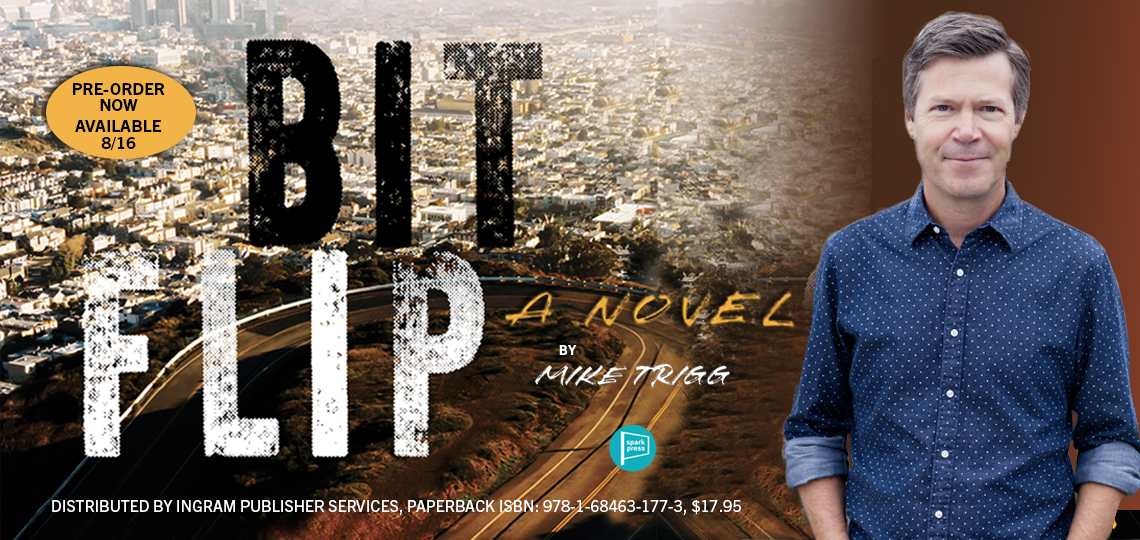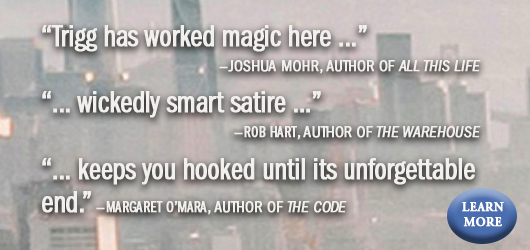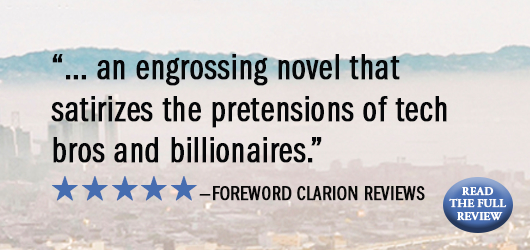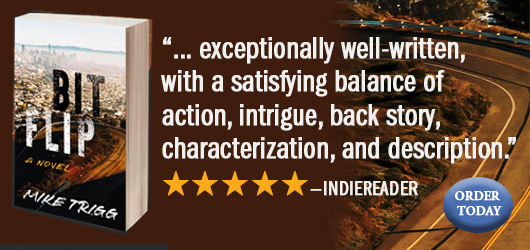Corruption in Silicon Valley: Reviewer Matt Benzing Interviews Mike Trigg, Author of Bit Flip

Reviewer Matt Benzing Interviews Mike Trigg, Author of Bit Flip
If you’re looking for an end-all explanation for how the the world got to be the technological wonder it is today, you need only two words, one place: Silicon Valley. That’s the epicenter of innovation, the place where every hopeful scientist, engineer, and mathematician with big dreams and an entrepreneurial spirit aspires to be. Silicon Valley is heaven on earth for techies.
And yet, what happens out there isn’t all that familiar to the rest of us. Sure, we hear about the grand slams leading to billions and biggest busts but the everyday-man and -woman stories just don’t make it off the Valley floor.
Which is what makes Mike Trigg’s new novel, Bit Flip, an enthralling read. An executive in Silicon Valley for many years, Mike knows the ropes—from founding startups to going public—and the greed and corruption that can result.
We wanted more, so we put reviewer Matt Benzing, author of the Foreword Clarion Review of Bit Flip, together with Mike for the following insider conversation.

Have you ever had the temptation to go on a rant and tell the truth to everyone at a tech conference, like Sam does at the beginning of the book?
Yes, many times! As a C-level executive, I did this sort of chest-thumping panel discussion at various technology conferences regularly over the course of my career. There’s a distinct humble-brag rhetoric to these sorts of speaking appearances, and I often felt the cognitive disconnect that leads Sam to his mic-drop moment. I always managed to stay on-script though, and never had the gumption to go on a similar truth-saying rant. But I have definitely shared the sentiment Sam expresses on-stage with many aspiring entrepreneurs. It is easy to feel like you’re a failure, even though the vast, vast majority of tech start-ups do, in fact, fail. And it’s easy to get so caught up in the demands of a start-up that it becomes your entire life.
The other thing I like about this scene is it opens the story with a nice hook. A true life-or-death situation didn’t fit the story, but I wanted the opening to be terrifying. So I went with something that many people describe as among their greatest fears: public speaking!
Sam is bitter about the kind of mortgage necessary for even a modest house in Silicon Valley. Do you think the growing acceptance of remote work will lead to less of a concentration of IT workers in congested, overpriced areas?
Yes and no. You see a lot of media stories about tech workers fleeing the Bay Area. Anecdotally, I know a lot of people who have moved to Austin, Portland, Denver, Nashville, Miami, and other cities. That said, there’s little evidence of a dramatic drop in home prices in the Bay Area, while prices in all these other emerging tech sector cities are rising rapidly.
I also personally believe there is incredible value in being physically proximate, especially for early-stage companies where camaraderie and communication are so critical. The increased acceptance of remote work has been great for work-life flexibility and reduced commutes, but, as I’ve written about on my site, I think companies will increasingly want their workers in the office as we come out of the pandemic. And I think a lot of employees are missing their work environments as well.
The startups that Sam visits are populated by some amusing, eccentric characters. Were these based on real people?
A lot of people who read the book are curious about this question. The truth is, while the behaviors are absolutely based on real people, no single character is based on a specific individual. The characters are composites derived from multiple people, experiences, and situations. For example, Peter Green, the reclusive billionaire and anti-mentor to Sam, is derived from dozens of people I either know personally or by reputation. I think that’s what makes the characters feel authentic despite being fictionalized. Anyone who lives here in the Bay Area or works in this kind of professional setting, has witnessed people like those in the book.
We can relate to Sam’s observations because we know people just like these characters. Yet, at the same time, we also need to recognize, as Sam does, that we are part of that culture ourselves, perpetuating its social conventions. I wanted to capture the learned behaviors, subtle prejudices, insider lingo, pervasive one-upmanship, and all the other eye-roll moments that are part of this world.
Do you think Sam is a hero?
This is a great question. The answer depends on your perspective. From a literary standpoint, Sam is the protagonist, and the story loosely follows the Hero’s Journey template, so, in that sense, yes—he’s the hero. From a cultural standpoint, coverage of Silicon Valley in both traditional and social media celebrates, reveres, and even glorifies tech executives who have been financially successful, so Sam might also be considered a hero from that perspective as well.
But from my personal standpoint, no—I don’t see him as a hero, and I don’t think Sam would think of himself as a hero either. With Sam, I wanted to break the clean hero/villain archetypes and show someone with deep moral complexity, even contradictions. Someone you root for but also feel sorry for. Someone who wins and loses at the same time.
The scenes set in central Ohio are quite convincing. Do you have roots there? Have you ever been tempted, as Sam is, to abandon the tech world and return?
I have deep Midwestern roots, but none specifically from Ohio. Although born in Kentucky, I mostly grew up in Wisconsin from about age two. My dad is from Michigan, my mom is from Minnesota, I have family in Iowa, and I went to college in Illinois. So I picked one of the few remaining Midwestern states I didn’t have direct ties to. Now, coincidentally, my oldest son goes to college in Ohio, so I’m forming some roots there as well.
What inspired these chapters was the complicated mix of emotions that leaving a place like Lima, Ohio, or my hometown of Appleton, Wisconsin, entails. For people with ambition and financial means, the expectation was largely to leave and pursue opportunities elsewhere. The jobs I was interested in doing simply didn’t exist in my hometown. But that dynamic can foster guilt in those who leave and resentment from those who stay. I feel this demographic shift which happened over a generation is at least partially responsible for the cultural and political divides we have in our country. While I now consider the Bay Area my home, I do think the trend of remote work and people leaving the coasts to move to other parts of the country is a good thing.
What inspired you to write this particular book at this particular time?
Being in tech, I read a lot of books about tech, from business advice to narrative nonfiction, and memoirs to biographies. But I really didn’t find much fiction about Silicon Valley or the tech industry, certainly not that I felt authentically captured this world from an insider’s perspective. So that’s what I set out to write. I wanted a book that was both a fast-paced corporate thriller, but also a satirical critique of tech start-up culture. Dave Eggers has struck this balance in his novels, The Circle and The Every, which both combined great plots with a clear message about the dark side of the tech industry.
I would also admit that, for my first novel, there was a benefit to following the advice to “write what you know.” Because the world of tech start-ups is so familiar to me, I found it easier to write about in a credible way.
As you were writing this book, what were some of the most important things you wanted to convey about life in Silicon Valley?
Silicon Valley is such an incredible place. There is a reason ambitious people have come here from all over the world—the economic opportunity, the inclusive culture, the amazing weather, just to name a few. As the epicenter of tech, arguably no other region has had as profound an impact on modern life as Silicon Valley. As the character Peter Green declares in the book, “Technology isn’t just a sector or an industry, it is the entire economy.”
That said, for all the great things about this area, there are also some pronounced negatives, including housing costs, homelessness, drought, and natural disasters. Furthermore, the outsized influence of Big Tech on our lives is causing a backlash. A host of problems, from gentrification to wealth inequality, data privacy to teen depression, can be blamed, at least in part, on tech. As a result, it’s become popular to hate on Silicon Valley.
Which gets me to the thing I most wanted to convey in this book. So much of what you read either glorifies or vilifies Silicon Valley and its companies and personalities. I wanted to present a more balanced perspective. Not only by conveying both the pros and the cons of the Bay Area, but by recognizing, in effect, that we all contribute to both the good and the bad. As Sam says in another moment of candor, “I may roll my eyes, but I’m chasing the same thing. I’m part of the problem … Every day, I further perpetuate the cliché that I can’t stand.” Creating change in any society can’t just be about blaming others. It needs to start by taking responsibility ourselves.
BIT FLIP
A NOVEL
Mike Trigg SparkPress (Aug 16, 2022) Softcover $17.95 (283pp) 978-1-68463-177-3 Foreword Clarion Review Rating: 5 out of 5
Bit Flip is an engrossing novel that satirizes the pretensions of tech bros and billionaires.
In Mike Trigg’s corporate novel Bit Flip, the seedy underbelly of San Francisco’s technology community is exposed.

Sam, the CFO of a technology firm, struggles with debt after renovations to his house run over budget. He’s also stressed out from having to clean up behind his irresponsible CEO, and incredulous at the gaudy and wasteful displays of wealth that are central to the Silicon Valley lifestyle.
While speaking at a technology conference, Sam has a moment of clarity. He launches into a rant about the futility of the corporate rat race, saying that, although tech firms like to talk about “doing good,” the truth is that “Greed and envy and pride and all the other deadly sins are the core flywheel of who we are.” The rant goes viral, and Sam is fired. He spirals as self-doubt and fear take hold. In time with seeking a new job, he deals with turbulence at home. In revisiting people and places from his past, Sam also discovers disturbing details about his former employer.
The book ably satirizes the cultivated eccentricities of Sam’s world, in which “ostentatious displays of knowledge on obscure topics” abound, and people bluster “on every possible area of expertise, from Italian bicycle parts to Cambodian green teas.” Sam works his way through San Francisco, lucidly observing its drastic extremes of wealth and poverty brought on by gentrification; an old friend who has acquired extreme wealth becomes obsessed with his security, for example, believing that his fortunes have made him a target.
Among the book’s characters, those in the technological industry are often positioned as merely self-obsessed and entitled; in contrast, Sam’s distress over the world he lives in, and the details of his midlife crisis, are caught in convincing terms. He is unsure of his place in the world, and interrogates his own motives and relationships at length. His decisions to question the exorbitant mortgage on his shabby house, the constant stresses that he faces, and the damage being done to his children as they are raised in such an environment are sympathetic. They are also convincingly juxtaposed to observations of small-town Ohio, which Sam revisits to observe the dying community he fled from, where people are poor, drunk, and resentful, and where small businesses struggle to survive.
As much a compelling narrative as it is a critical analysis of contemporary capitalism, this story worries over the coming future, in which technology could take over much of what people used to do. This helps to make Bit Flip an engrossing novel that satirizes the pretensions of tech bros and billionaires.
Reviewed by Matt Benzing March 29, 2022
Matt Benzing


